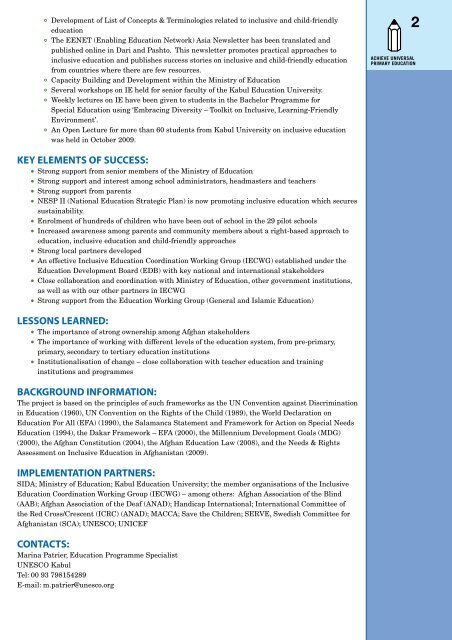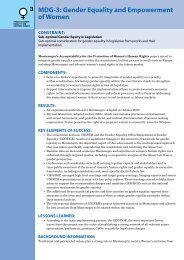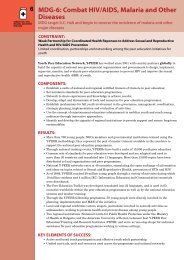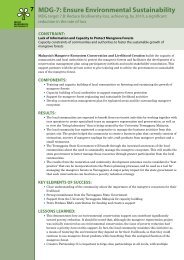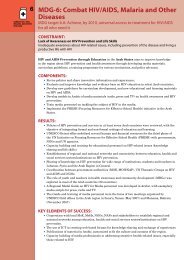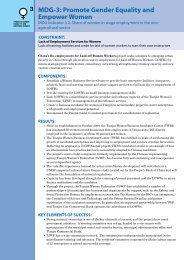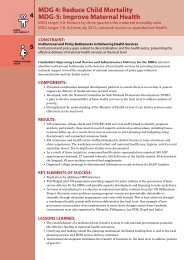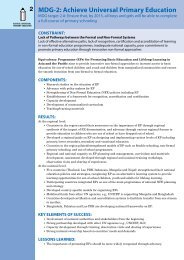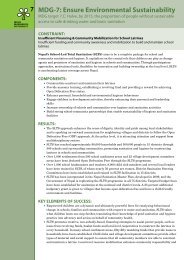Afghanistan Toward Inclusive Education - MDG Policy Network
Afghanistan Toward Inclusive Education - MDG Policy Network
Afghanistan Toward Inclusive Education - MDG Policy Network
Create successful ePaper yourself
Turn your PDF publications into a flip-book with our unique Google optimized e-Paper software.
• Development of List of Concepts & Terminologies related to inclusive and child-friendly<br />
education<br />
• The EENET (Enabling <strong>Education</strong> <strong>Network</strong>) Asia Newsletter has been translated and<br />
published online in Dari and Pashto. This newsletter promotes practical approaches to<br />
inclusive education and publishes success stories on inclusive and child-friendly education<br />
from countries where there are few resources.<br />
• Capacity Building and Development within the Ministry of <strong>Education</strong><br />
• Several workshops on IE held for senior faculty of the Kabul <strong>Education</strong> University.<br />
• Weekly lectures on IE have been given to students in the Bachelor Programme for<br />
Special <strong>Education</strong> using ‘Embracing Diversity – Toolkit on <strong>Inclusive</strong>, Learning-Friendly<br />
Environment’.<br />
• An Open Lecture for more than 60 students from Kabul University on inclusive education<br />
was held in October 2009.<br />
Key Elements of Success:<br />
• Strong support from senior members of the Ministry of <strong>Education</strong><br />
• Strong support and interest among school administrators, headmasters and teachers<br />
• Strong support from parents<br />
• NESP II (National <strong>Education</strong> Strategic Plan) is now promoting inclusive education which secures<br />
sustainability.<br />
• Enrolment of hundreds of children who have been out of school in the 29 pilot schools<br />
• Increased awareness among parents and community members about a right-based approach to<br />
education, inclusive education and child-friendly approaches<br />
• Strong local partners developed<br />
• An effective <strong>Inclusive</strong> <strong>Education</strong> Coordination Working Group (IECWG) established under the<br />
<strong>Education</strong> Development Board (EDB) with key national and international stakeholders<br />
• Close collaboration and coordination with Ministry of <strong>Education</strong>, other government institutions,<br />
as well as with our other partners in IECWG<br />
• Strong support from the <strong>Education</strong> Working Group (General and Islamic <strong>Education</strong>)<br />
Lessons Learned:<br />
• The importance of strong ownership among Afghan stakeholders<br />
• The importance of working with different levels of the education system, from pre-primary,<br />
primary, secondary to tertiary education institutions<br />
• Institutionalisation of change – close collaboration with teacher education and training<br />
institutions and programmes<br />
Background Information:<br />
The project is based on the principles of such frameworks as the UN Convention against Discrimination<br />
in <strong>Education</strong> (1960), UN Convention on the Rights of the Child (1989), the World Declaration on<br />
<strong>Education</strong> For All (EFA) (1990), the Salamanca Statement and Framework for Action on Special Needs<br />
<strong>Education</strong> (1994), the Dakar Framework – EFA (2000), the Millennium Development Goals (<strong>MDG</strong>)<br />
(2000), the Afghan Constitution (2004), the Afghan <strong>Education</strong> Law (2008), and the Needs & Rights<br />
Assessment on <strong>Inclusive</strong> <strong>Education</strong> in <strong>Afghanistan</strong> (2009).<br />
Implementation Partners:<br />
SIDA; Ministry of <strong>Education</strong>; Kabul <strong>Education</strong> University; the member organisations of the <strong>Inclusive</strong><br />
<strong>Education</strong> Coordination Working Group (IECWG) – among others: Afghan Association of the Blind<br />
(AAB); Afghan Association of the Deaf (ANAD); Handicap International; International Committee of<br />
the Red Cross/Crescent (ICRC) (ANAD); MACCA; Save the Children; SERVE, Swedish Committee for<br />
<strong>Afghanistan</strong> (SCA); UNESCO; UNICEF<br />
Contacts:<br />
Marina Patrier, <strong>Education</strong> Programme Specialist<br />
UNESCO Kabul<br />
Tel: 00 93 798154289<br />
E-mail: m.patrier@unesco.org


